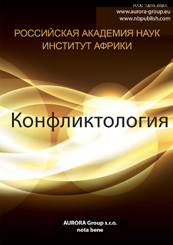State policies in diffusing modern conflicts
Reference:
Belkov A.D.
Abiy Ahmed's Domestic Policy in Ethiopia: Securitization and conflict resolution
// Conflict Studies / nota bene.
2024. № 2.
P. 1-13.
DOI: 10.7256/2454-0617.2024.2.70095 EDN: ZQWJWT URL: https://en.nbpublish.com/library_read_article.php?id=70095
 This work is licensed under a Creative Commons Attribution-NonCommercial 4.0 International License.
This work is licensed under a Creative Commons Attribution-NonCommercial 4.0 International License.|
Read the article
Peer Review: |
EDN: ZQWJWT |

 Eng
Eng












 © 1998 – 2024 Nota Bene. Publishing Technologies. NB-Media Ltd.
© 1998 – 2024 Nota Bene. Publishing Technologies. NB-Media Ltd.




